In the realm of employment, hourly tipped employees often face unique challenges in securing affordable healthcare coverage. This comprehensive guide delves into the intricacies of healthcare options available to these individuals, exploring employer-sponsored plans, government programs, individual policies, and various financial assistance initiatives.
We aim to provide a clear understanding of the complexities involved and empower hourly tipped workers with the knowledge they need to make informed decisions about their healthcare.
The landscape of healthcare coverage for hourly tipped employees is constantly evolving, with new opportunities and challenges emerging. This guide will provide up-to-date information and insights to help these individuals navigate the complexities of the healthcare system and access the coverage they need to stay healthy and productive.
Hourly Tipped Employee Healthcare Coverage
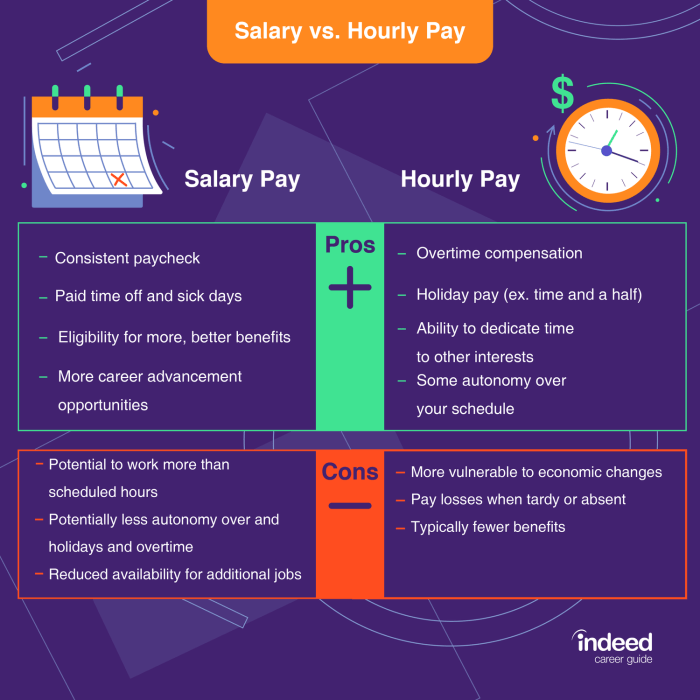
Hourly tipped employees in the United States often face challenges in accessing affordable healthcare coverage due to their fluctuating income and lack of employer-sponsored health insurance.
The healthcare coverage options available to hourly tipped employees include:
- Employer-Sponsored Health Insurance: Some employers may offer health insurance coverage to their tipped employees, but this is not common in the service industry, where many hourly tipped employees work.
- Individual Health Insurance: Hourly tipped employees can purchase individual health insurance plans through the Health Insurance Marketplace or directly from insurance companies. However, these plans can be expensive, especially for low-income individuals.
- Medicaid: Hourly tipped employees who meet certain income and eligibility requirements may qualify for Medicaid, a government-sponsored health insurance program for low-income individuals.
- Medicare: Hourly tipped employees who are 65 years of age or older or who have certain disabilities may qualify for Medicare, a government-sponsored health insurance program for seniors and disabled individuals.
Challenges Faced by Hourly Tipped Employees in Accessing Affordable Healthcare Coverage
Hourly tipped employees face several challenges in accessing affordable healthcare coverage, including:
- Fluctuating Income: Hourly tipped employees often have fluctuating incomes, making it difficult to budget for health insurance premiums.
- Lack of Employer-Sponsored Health Insurance: Many hourly tipped employees work in the service industry, where employers are less likely to offer health insurance coverage.
- High Cost of Individual Health Insurance: Individual health insurance plans can be expensive, especially for low-income individuals.
- Lack of Awareness of Available Options: Some hourly tipped employees may not be aware of the healthcare coverage options available to them.
Employer-Sponsored Health Insurance
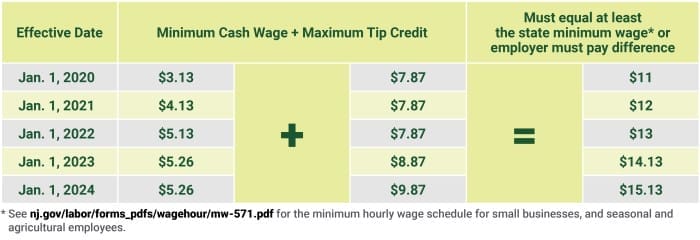
Employer-sponsored health insurance plays a significant role in providing coverage to hourly tipped employees. It offers a safety net for medical expenses and access to preventive care, promoting overall well-being and productivity.
Benefits of Employer-Sponsored Health Insurance:
- Financial Protection: Health insurance safeguards hourly tipped employees from unexpected medical expenses, preventing financial burdens and ensuring access to necessary care.
- Comprehensive Coverage: Employer-sponsored plans often provide comprehensive coverage, including preventive care, doctor visits, hospitalization, prescription drugs, and specialist consultations.
- Access to Quality Care: These plans typically offer access to a network of healthcare providers, ensuring quality care and convenience for employees.
Limitations of Employer-Sponsored Health Insurance:
- Affordability: Premiums for employer-sponsored health insurance can be costly, especially for small businesses with limited resources.
- Limited Coverage Options: Some plans may have limited coverage options, excluding certain treatments or medications.
- High Deductibles: Many employer-sponsored plans have high deductibles, requiring employees to pay a substantial amount out-of-pocket before insurance coverage begins.
Strategies to Improve Accessibility:
Employers can implement several strategies to make employer-sponsored health insurance more accessible to hourly tipped employees:
- Offer Affordable Plans: Employers can explore cost-effective health insurance plans that fit the budget of hourly tipped employees, considering factors like premiums, deductibles, and copayments.
- Provide Subsidies: Employers can offer subsidies or contributions to help cover the cost of health insurance premiums, making it more affordable for employees.
- Educate Employees: Employers can conduct educational sessions to inform hourly tipped employees about the benefits of health insurance, available plans, and enrollment processes.
- Simplify Enrollment: Employers can streamline the enrollment process, making it easy for hourly tipped employees to sign up for health insurance coverage.
Government-Sponsored Health Insurance
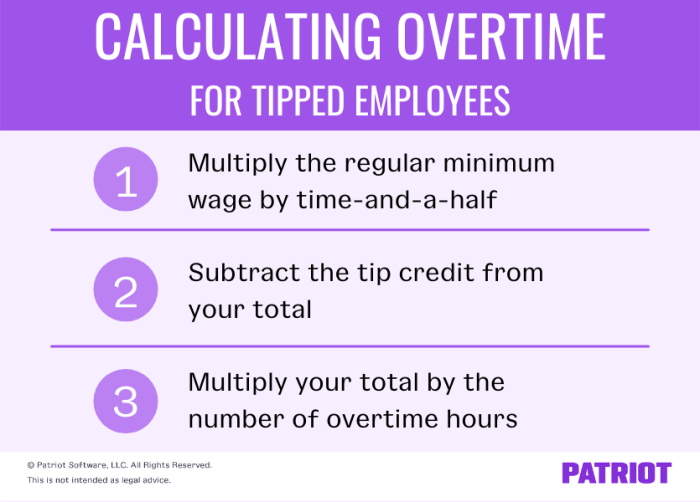
Hourly tipped employees may be eligible for government-sponsored health insurance programs, which provide affordable healthcare coverage to low-income individuals and families. These programs include Medicaid, Medicare, and the Children’s Health Insurance Program (CHIP).
Eligibility Criteria and Application Process
Eligibility for government-sponsored health insurance programs varies depending on the program and the state in which the employee resides. Generally, to be eligible for Medicaid, an individual must be a low-income adult, child, pregnant woman, or person with a disability.
Medicare is available to individuals aged 65 or older, as well as those with certain disabilities or end-stage renal disease. CHIP provides health insurance coverage to children and teens from families with incomes too high to qualify for Medicaid but too low to afford private health insurance.To
apply for government-sponsored health insurance, individuals can contact their state Medicaid or CHIP office or visit the website of the Centers for Medicare & Medicaid Services (CMS). Applications can be submitted online, by mail, or in person.
Benefits and Limitations
Government-sponsored health insurance programs offer a range of benefits, including coverage for doctor visits, hospital stays, prescription drugs, and mental health services. However, these programs also have some limitations. For example, Medicaid and CHIP typically have income and asset limits, and Medicare has a deductible and copayments for some services.Despite
these limitations, government-sponsored health insurance programs can provide affordable and comprehensive healthcare coverage to hourly tipped employees who would otherwise be uninsured. These programs play a vital role in ensuring that all Americans have access to quality healthcare.
Individual Health Insurance
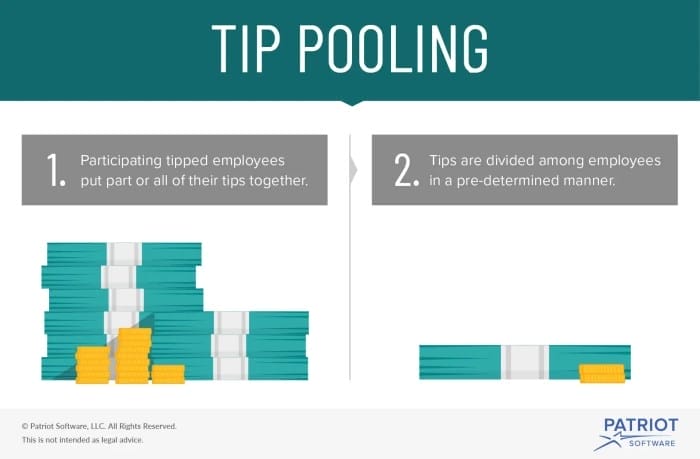
Hourly tipped employees can choose to purchase individual health insurance plans to cover their healthcare needs. These plans are typically more expensive than employer-sponsored plans, but they offer more flexibility and control over the coverage options.
The cost of individual health insurance premiums is determined by several factors, including the individual’s age, health status, location, and the type of coverage selected. Premiums can vary significantly from one insurance company to another, so it is important to shop around and compare plans before making a decision.
Benefits of Individual Health Insurance
- Flexibility: Individual health insurance plans offer more flexibility than employer-sponsored plans, allowing individuals to choose the level of coverage that best meets their needs and budget.
- Portability: Individual health insurance plans are portable, meaning they can be taken with the individual if they change jobs or move to a new location.
- Choice of Providers: Individual health insurance plans typically offer a wider range of providers to choose from, giving individuals more options for their healthcare.
Limitations of Individual Health Insurance
- Higher Cost: Individual health insurance premiums are typically higher than employer-sponsored plans, making them less affordable for some individuals.
- Limited Coverage: Individual health insurance plans may not offer as comprehensive coverage as employer-sponsored plans, leaving individuals with out-of-pocket expenses for certain services.
- Lack of Employer Contributions: Individual health insurance plans do not receive employer contributions, meaning the entire cost of the premium is borne by the individual.
Health Insurance Subsidies
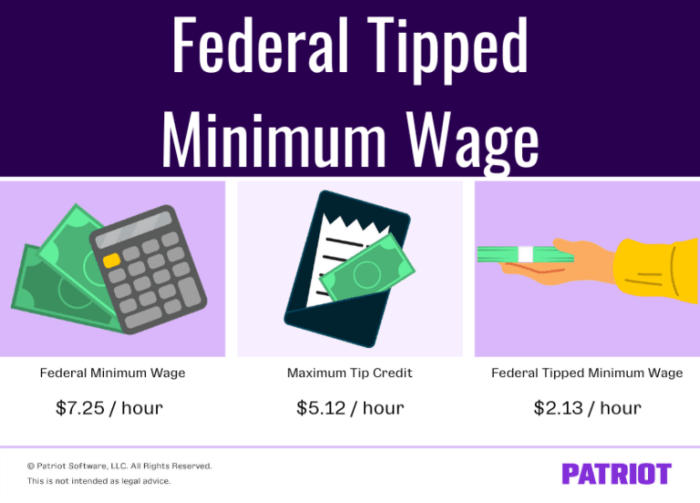
Hourly tipped employees may be eligible for health insurance subsidies to help them afford health insurance coverage. These subsidies are available through the Health Insurance Marketplace, a government-run website where individuals and families can shop for and compare health insurance plans.
To be eligible for health insurance subsidies, hourly tipped employees must meet certain income requirements. The amount of the subsidy depends on the employee’s income, family size, and the cost of health insurance plans in their area.
Applying for Health Insurance Subsidies
To apply for health insurance subsidies, hourly tipped employees can visit the Health Insurance Marketplace website or contact a Marketplace-certified agent or broker. The application process is relatively simple and can be completed online or over the phone.
When applying for health insurance subsidies, hourly tipped employees will need to provide information about their income, family size, and current health insurance coverage. They will also need to choose a health insurance plan from the Marketplace.
Impact of Health Insurance Subsidies
Health insurance subsidies can make a significant difference in the affordability of health insurance for hourly tipped employees. For many employees, the subsidy can cover a large portion of the cost of their monthly premium. This can make it much easier for hourly tipped employees to afford the health insurance coverage they need.
Health Savings Accounts (HSAs)
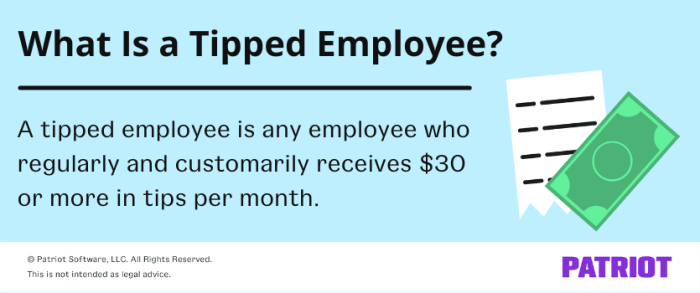
Health Savings Accounts (HSAs) are tax-advantaged savings accounts that allow hourly tipped employees to set aside money for qualified medical expenses. These accounts are available to individuals who are enrolled in a high-deductible health plan (HDHP).HSAs offer several benefits to hourly tipped employees.
First, contributions to HSAs are tax-deductible, which can reduce your taxable income. Second, the money in your HSA grows tax-free, and you can withdraw it tax-free to pay for qualified medical expenses. Third, HSAs can be used to pay for a wide range of medical expenses, including deductibles, copayments, coinsurance, and prescription drugs.
Contribution Limits
The amount you can contribute to your HSA each year is limited by the IRS. For 2023, the contribution limits are $3,850 for individuals and $7,750 for families. If you are age 55 or older, you can make an additional catch-up contribution of $1,000.
Investment Options
The money in your HSA can be invested in a variety of investment options, such as stocks, bonds, and mutual funds. This allows you to grow your savings over time and potentially earn a return on your investment.
Benefits and Limitations
HSAs can be a great way for hourly tipped employees to save money for healthcare expenses. However, there are some limitations to be aware of. First, you must be enrolled in an HDHP to be eligible for an HSA. Second, HSAs have annual contribution limits.
Third, you cannot use your HSA to pay for premiums for your health insurance plan.
Flexible Spending Accounts (FSAs)
Flexible Spending Accounts (FSAs) are a popular way for hourly employees to save money for healthcare expenses. They allow employees to set aside a portion of their pre-tax income to pay for eligible medical, dental, and vision expenses. This can be a great way to save money on healthcare costs, especially if you have high deductible health insurance.
Contribution Limits
The amount you can contribute to an FSA is limited by the IRS. For 2023, the maximum contribution limit is $3,050 for individuals and $6,100 for families. Employers may also set their own contribution limits, which may be lower than the IRS limits.
Eligible Expenses
FSAs can be used to pay for a wide range of healthcare expenses, including:
- Doctor visits
- Prescription drugs
- Dental care
- Vision care
- Medical equipment
- Long-term care
There are some expenses that are not eligible for FSA reimbursement, such as cosmetic surgery and over-the-counter medications.
Benefits of FSAs
There are several benefits to using an FSA, including:
- Tax savings: Contributions to an FSA are made with pre-tax income, which means you pay less in taxes. This can save you a significant amount of money, especially if you have a high marginal tax rate.
- Flexibility: FSAs can be used to pay for a wide range of healthcare expenses, so you can use the money for the expenses that you need the most.
- Convenience: FSAs are easy to use. You simply swipe your FSA card at the doctor’s office or pharmacy, and the expense is automatically reimbursed.
Limitations of FSAs
There are also some limitations to using an FSA, including:
- Use-it-or-lose-it: The money in your FSA must be used by the end of the plan year, or you will lose it. This can be a problem if you do not have a lot of healthcare expenses during the year.
- Contribution limits: The amount you can contribute to an FSA is limited by the IRS. This may not be enough to cover all of your healthcare expenses.
- Ineligibility: Not all employers offer FSAs. If your employer does not offer an FSA, you will not be able to use one.
Overall, FSAs can be a great way for hourly employees to save money on healthcare expenses. However, it is important to understand the benefits and limitations of FSAs before you decide if one is right for you.
Community Health Centers
Community health centers play a vital role in providing affordable and accessible healthcare services to hourly tipped employees, who often face challenges in obtaining health insurance coverage due to their income and employment status.
These centers are non-profit organizations that receive funding from the federal government and other sources to provide comprehensive healthcare services to underserved communities, including hourly tipped employees.
Services Offered by Community Health Centers
Community health centers offer a wide range of services to meet the needs of hourly tipped employees, including:
- Primary care: Routine checkups, preventive care, and treatment for common illnesses and injuries.
- Dental care: Routine checkups, cleanings, and treatment for dental problems.
- Mental health care: Counseling, therapy, and medication management for mental health conditions.
- Substance abuse treatment: Counseling, therapy, and medication management for substance abuse problems.
- Women’s health care: Prenatal care, family planning, and gynecological services.
- Pediatric care: Well-child visits, immunizations, and treatment for childhood illnesses and injuries.
- Pharmacy services: Prescription medications at discounted prices.
Benefits of Utilizing Community Health Centers
There are several benefits to utilizing community health centers for hourly tipped employees:
- Affordability: Community health centers offer services at a reduced cost, making them more affordable for hourly tipped employees who may have limited financial resources.
- Accessibility: Community health centers are often located in underserved communities, making them easily accessible to hourly tipped employees who may not have transportation or the ability to travel long distances to receive care.
- Comprehensive care: Community health centers offer a wide range of services, allowing hourly tipped employees to receive all of their healthcare needs in one place.
- Patient-centered care: Community health centers focus on providing patient-centered care, which means that they take into account the individual needs and preferences of each patient.
Limitations of Utilizing Community Health Centers
There are also some limitations to utilizing community health centers for hourly tipped employees:
- Long wait times: Community health centers often have long wait times for appointments, which can be inconvenient for hourly tipped employees who may have limited time off from work.
- Limited hours of operation: Community health centers may have limited hours of operation, which can make it difficult for hourly tipped employees who work evenings or weekends to access care.
- Limited services: Community health centers may not offer all of the services that hourly tipped employees need, such as specialty care or surgery.
Telehealth Services
Telehealth services are revolutionizing healthcare delivery by providing convenient and accessible care to patients, including hourly tipped employees. These services leverage technology to connect patients with healthcare providers remotely, expanding access to quality healthcare beyond traditional in-person visits.
Telehealth services encompass a wide range of healthcare services, including:
- Virtual doctor visits: Patients can consult with healthcare providers via videoconferencing, phone calls, or secure messaging platforms.
- Remote monitoring: Patients can use wearable devices or smartphone apps to track and transmit health data, allowing healthcare providers to monitor their health remotely.
- E-prescriptions: Healthcare providers can electronically prescribe medications, which patients can pick up from their local pharmacy.
- Tele-mental health: Patients can access mental health services, such as therapy and counseling, remotely.
Benefits of Telehealth Services for Hourly Tipped Employees
Telehealth services offer numerous benefits for hourly tipped employees, including:
- Convenience: Telehealth services allow employees to receive care from the comfort of their homes or workplaces, eliminating the need for travel and time off work.
- Accessibility: Telehealth services are especially beneficial for employees who live in rural or underserved areas with limited access to healthcare providers.
- Affordability: Telehealth services are often more affordable than traditional in-person visits, as they eliminate transportation and parking costs.
- Privacy: Telehealth services provide a private and confidential way for employees to discuss their health concerns with healthcare providers.
Limitations of Telehealth Services
While telehealth services offer numerous benefits, there are also some limitations to consider:
- Lack of physical examination: Telehealth services may not be suitable for conditions that require a physical examination.
- Technology requirements: Telehealth services require access to a computer, smartphone, or tablet with a stable internet connection.
- Potential for technical difficulties: Technical issues, such as poor internet connectivity or software glitches, can disrupt telehealth appointments.
Healthcare Advocacy Organizations
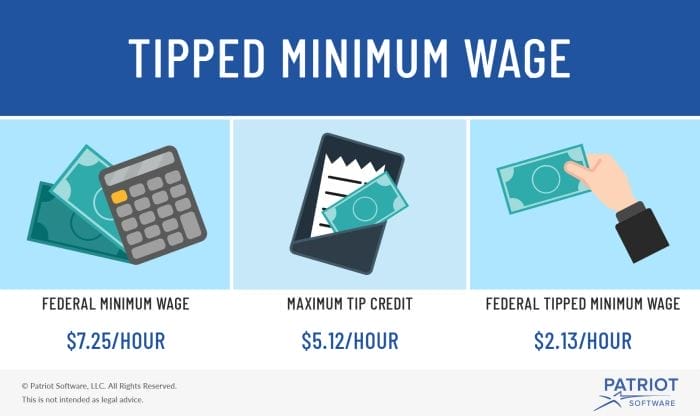
Healthcare advocacy organizations play a vital role in supporting hourly tipped employees in accessing affordable healthcare coverage. These organizations advocate for policies that expand access to healthcare, provide direct services to hourly tipped employees, and educate them about their healthcare options.Healthcare
advocacy organizations typically offer a range of services to hourly tipped employees, including:
Healthcare Coverage Counseling
Providing information and guidance to hourly tipped employees about their healthcare coverage options, including employer-sponsored health insurance, government-sponsored health insurance, and individual health insurance.
Advocacy for Affordable Healthcare
Working to ensure that hourly tipped employees have access to affordable healthcare coverage, including advocating for policies that expand Medicaid and provide subsidies for health insurance premiums.
Negotiating Discounts on Healthcare Services
Partnering with healthcare providers to negotiate discounts on healthcare services for hourly tipped employees.
Providing Financial Assistance
Offering financial assistance to hourly tipped employees who are struggling to pay for healthcare costs, including co-pays, deductibles, and premiums.
Healthcare Advocacy Organizations have a significant impact on improving healthcare access for hourly tipped employees. By providing information, counseling, and advocacy, these organizations help hourly tipped employees to find affordable healthcare coverage and access the care they need.
Final Summary
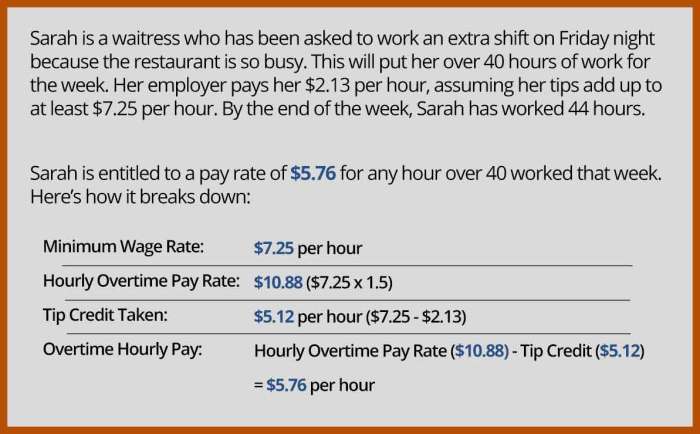
The pursuit of affordable healthcare coverage for hourly tipped employees is an ongoing endeavor that requires a multifaceted approach. By understanding the various options available, including employer-sponsored plans, government programs, individual policies, and financial assistance initiatives, these individuals can make informed decisions about their healthcare.
Furthermore, advocating for policies that expand access to affordable coverage and supporting organizations that provide assistance to hourly tipped employees are crucial steps towards creating a more equitable healthcare system.
FAQ Section
How do employer-sponsored health insurance plans work for hourly tipped employees?
Employer-sponsored health insurance plans can provide coverage for hourly tipped employees, but the extent of coverage and costs may vary. Employers may offer a range of plans, including HMOs, PPOs, and EPOs, each with its own set of benefits, limitations, and costs.
What government-sponsored health insurance programs are available to hourly tipped employees?
Hourly tipped employees may be eligible for government-sponsored health insurance programs such as Medicaid, Medicare, and the Children’s Health Insurance Program (CHIP). Eligibility for these programs is based on income and other factors, and coverage may vary depending on the program and state of residence.
How can hourly tipped employees purchase individual health insurance?
Hourly tipped employees can purchase individual health insurance through the Health Insurance Marketplace or directly from insurance companies. The cost of individual health insurance premiums is based on factors such as age, location, and health status. Financial assistance may be available to help lower the cost of premiums.
What are Health Savings Accounts (HSAs) and how can hourly tipped employees use them?
Health Savings Accounts (HSAs) are tax-advantaged savings accounts that can be used to pay for qualified medical expenses. Hourly tipped employees can contribute to HSAs if they are enrolled in a high-deductible health plan (HDHP). Contributions to HSAs are tax-deductible, and withdrawals are tax-free if used for qualified medical expenses.
How can hourly tipped employees access healthcare services through community health centers?
Community health centers provide affordable healthcare services to low-income individuals, including hourly tipped employees. These centers offer a range of services, including primary care, dental care, mental health care, and prescription drug assistance. Fees for services are based on a sliding scale, and some services may be provided at no cost.



